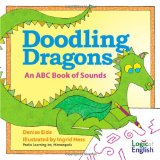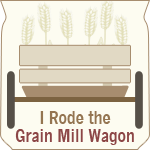![360/365 - 09/23/10 [365 Days @ 50mm] - Alphabet Soup](../../../4151/5018630383_487df5c809.jpg)
I admit it. I’m totally a phonics geek. I love the phonetic aspect of language, and I love the challenge of untangling the mysteries of the sound-spelling relationship of the English language. I get practically giddy when I contemplate the various spellings of the long sound “a”, and I happen to think that homonyms are all sorts of fun.
You, too?
Or maybe not so much?
No matter which camp you’re in, you’re going to love this book that I discovered recently: It offers jewels of spelling insight that will delight the most decorated spelling bee contestant while at the same time clearing up mysteries of English phonetics that have left the rest of us scratching our heads in puzzlement our entire lives.
Uncovering The Logic of English, written by Denise Eide, answers the following questions (and more!) that have been plaguing you:
What’s with all the silent “e’s”?!
(With only a few exceptions, each silent “e” serves a distinct purpose.)
Are there any actual rules governing this language or is it just a big jumble of exceptions?
(There are definitely rules, and not as many of them as you might think; and they are far more consistent than they seem at first glance.)
Why do I have to add an “r” to “prefer” before adding the suffix “-ing”, but not when adding the suffix “-ence”?
(The answer lies in the accented syllable.)
Denise Eide walks her readers through a logical progression of the rules that govern our oft-maligned language, wording each rule in the clearest language possible so as to avoid confusion and generalizations. You won’t find such pithy statements as “When two vowels go walking, the first one does the talking” in this book, because that’s simply not true. I mean, have you ever encountered words like “niece” and “launch” that totally defy this frequently quoted but grossly inaccurate “rule”? It’s not that “niece” and “launch” are exceptions to the rule; it’s that the rule is wrong.
Denise takes the confusion out of the rules and states them accurately and clearly. In doing so, she proves that the exceptions to the rules are not nearly as frequent as we have often been lead to believe: In fact, she asserts that the 30 rules she has compiled in this book govern 98% of commonly used English words, leaving a mere 2% as true exceptions.
Uncovering the Logic of English was, for me, a quick and fascinating read. I did not agree with absolutely everything stated in the book; there were some phonograms not listed that I thought should be included, and once or twice, I thought it would be easier to state certain words as exceptions rather than creating an entire rule around them. But even so, I believe that every English speaker (and English writer and reader!) should read this book. Maybe even a couple times! You will no longer be confused by the seemingly irrational spelling patterns that have developed through the centuries, and will gain an appreciation for the logic that does indeed exist within the phonetic system of English!
If you homeschool (or teach) and have students that struggle with spelling and/or reading, then you need this book. I am confident it will be of more help to you than any other spelling or reading resource you might find.
Uncovering the Logic of English is available on Amazon.com for $13.60, or you can get the Kindle version for $7.99.

![]()
Denise Eide has also authored a cute little children’s alphabet book called Doodling Dragons that takes the time to teach the multiple sounds each letter can make in a simple and engaging way. Most alphabet books stop short with each letter’s most common sound, but this book briefly illustrates all the sounds each letter can make. The Boys find it funny and interesting, and it’s short enough to keep their attention from beginning to end.
Disclosure: I received both of these books for free at a conference, but was under no obligation to write a positive review. I was just really fascinated and wanted to share it with you.


Hi there, Thanks for submitting your blog to Hocoblogs. I saw that you also have a YouTube channel. We’d love to have that listed as a “blog,” too. http://hocoblogs.com/submit_blog.html And if you know any other HoCo people who blog — particularly crafters, makers and DIYers — let me know. Thanks!